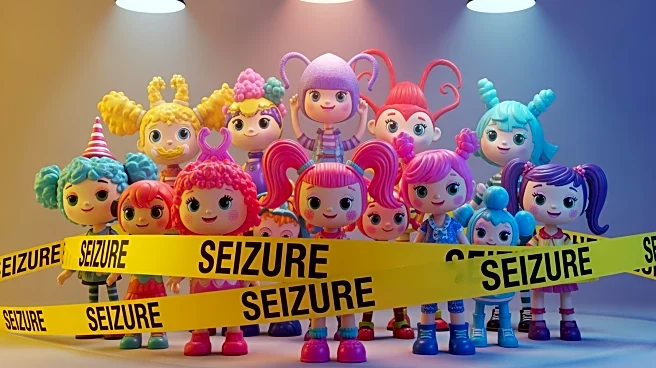What's Happening?
Customs and Border Protection (CBP) has seized over 11,000 counterfeit Labubu dolls at Seattle Airport, valued at $500,000. Labubu, a popular designer toy created by Kasing Lung and marketed by Pop Mart,
has become a target for counterfeiters due to its limited availability and high resale value. The U.S. Consumer Product Safety Commission issued a safety warning about these counterfeit dolls, known as 'Lafufus,' which pose choking risks and may contain toxic materials. Pop Mart is actively combating counterfeiting through trademark registrations and anti-counterfeiting measures, including distinct product features and packaging with QR codes and holographic stickers.
Why It's Important?
The seizure of counterfeit Labubu dolls highlights the ongoing issue of intellectual property theft in the U.S. toy market. Counterfeiting not only affects Pop Mart's profits but also poses safety risks to consumers. The presence of counterfeit goods can undermine consumer trust and damage brand reputation. Pop Mart's legal actions against entities like 7-Eleven for selling counterfeit products demonstrate the company's commitment to protecting its brand and ensuring consumer safety. This situation underscores the importance of robust intellectual property enforcement and consumer protection measures in maintaining market integrity.
What's Next?
Pop Mart is pursuing legal action against 7-Eleven and its franchisees for trademark infringement, seeking injunctive relief and damages. The company aims to strengthen its anti-counterfeiting efforts and collaborate with enforcement agencies like CBP to prevent further distribution of counterfeit products. As Pop Mart continues to address these challenges, it must balance brand protection with strategic product releases to maintain consumer interest and avoid market saturation.
Beyond the Headlines
The counterfeiting crisis surrounding Labubu dolls raises broader questions about the ethical implications of intellectual property theft and consumer safety. It highlights the need for companies to innovate in anti-counterfeiting technologies and collaborate with international enforcement agencies. The situation also reflects the cultural impact of designer toys and the challenges of preserving artistic integrity in a global market.









